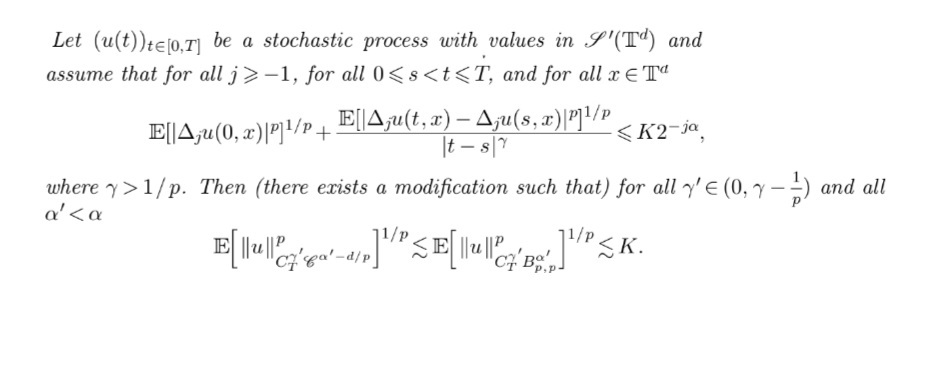Consider a space-time white noise $\xi$ and the heat semi-group $(P_r).$
The following Kolmogorov type criterion allows to construct modifications in Besov Space (Here we have a partition of unity $(\rho_j)_j,$ for a distribution $\Delta_jf:=\mathscr{F}^{-1}\rho_j*f:=K_j*f$):
 Applying this theorem we get modification for stochastic convolution (for dimensions $d>1$$d=1$) $X_r(\phi):=\int_0^r\int_{\mathbb{T}^1}(\phi,p(r-q,y-\cdot))\xi(dq,dy).$
Applying this theorem we get modification for stochastic convolution (for dimensions $d>1$$d=1$) $X_r(\phi):=\int_0^r\int_{\mathbb{T}^1}(\phi,p(r-q,y-\cdot))\xi(dq,dy).$
By renormalizing and regularizing $|\partial_x X|^2$ we can prove that the limit is actually $U_r:=\int_{([0,r] \times \mathbb{T}^1)^2}(\phi,\partial_xp(r-q_1,y_1-\cdot)\partial_x p(r-q_2,y_2-\cdot))d\xi(q_1,y_1)d\xi(q_2,y_2), $$U_r(\phi):=\int_{([0,r] \times \mathbb{T}^1)^2}(\phi,\partial_xp(r-q_1,y_1-\cdot)\partial_x p(r-q_2,y_2-\cdot))d\xi(q_1,y_1)d\xi(q_2,y_2), $(using Hermite polynomial $H_2$, we can express it in term of second Wiener-Ito integral, using Nelson inequality we deduce that the assumptions of the above theorem are verified).
Let $Y_r:=\int_0^rP_{r-q}(U_q)dq$ (Modifications of $Y$ in Besov spaces already exists since we already did the construction for the term inside).
By renormalizing and regularizing $W(r):= \partial_x X_r \partial_xY_r,$ what would be the limit expressed in term of iterated integrals?
